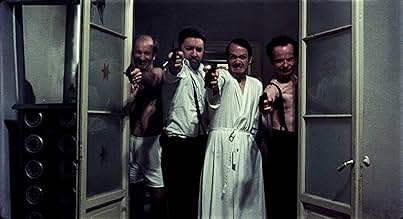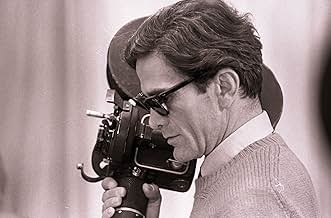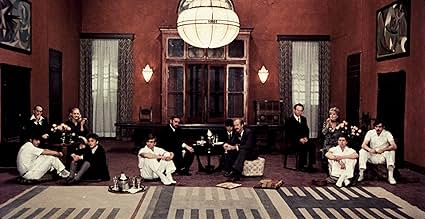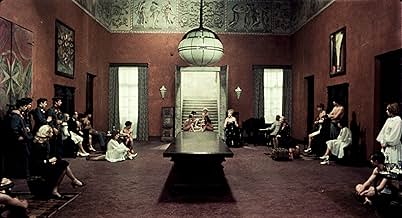
Play clip3:12
Watch If You Liked Terrifier 3, Watchlist These Endurance Horror Classics
In World War II Italy, four fascist libertines round up nine adolescent boys and girls and subject them to 120 days of torture.In World War II Italy, four fascist libertines round up nine adolescent boys and girls and subject them to 120 days of torture.In World War II Italy, four fascist libertines round up nine adolescent boys and girls and subject them to 120 days of torture.
- Awards
- 1 win
Uberto Paolo Quintavalle
- Eccellenza
- (as Umberto P. Quintavalle)
Hélène Surgère
- Signora Vaccari
- (as Helene Surgere)
Storyline
Did you know
- TriviaDespite the grim subject throughout the film, in an interview on the second disc of the Criterion Collection box set, actress Hélène Surgère claimed the mood was actually rather jovial on the set and that none of the teenage actors were actually harmed or traumatized. She said the abundance of teenagers who had never acted before led the mood to be happy and at times, even fun, with the cast often playing practical jokes on each other. She also said that the movie was literally "made" in the editing room and the filmmakers had no idea how grim a movie it was until they saw the finished product at the premiere.
- GoofsWhen the Duke kisses several victims during Sergio and Renata's wedding, some victims and Ezio begin to laugh, off the character.
- Crazy creditsEssential Bibliography: Roland Barthes: 'Sade, Fourier, Loyola' (Editions du Seuil); Maurice Blanchot: "Lautréamont et Sade' (Editions de Minuit; in Italy Dedalo Libri); Simone de Beauvoir: 'Faut-il brûler Sade' (Editions Gaimard); Pierre Klossowski: 'Sade mon prochain, le philosophe scélérat' (Editions du Seuil; in Italy SugarCo Edizioni); Philippe Sollers: 'L'écriture et l'experience des limites' (Editions du Seuil)
- Alternate versionsThe film was rejected for cinema by the BBFC in 1976 and a private showing of the uncut version at the Old Compton Cinema Club in London's Soho resulted in a police raid and confiscation of the movie. A heavily edited version - minus 6 minutes of footage including scenes of torture, homosexuality and excrement eating, and including a 4 minute prologue describing the history of the town of Salo - was later prepared by UK censor James Ferman for club showings. The film was finally passed completely uncut for cinema and video in the UK in December 2000.
- ConnectionsEdited into Histoire(s) du cinéma: Une histoire seule (1989)
- SoundtracksPrelude in C minor
(uncredited)
Composed by Frédéric Chopin (uncredited)
Played by Arnaldo Graziosi (uncredited)
Featured review
Reportedly, when the executives of one, now defunct, American film company saw "Saló", which they helped co-finance and had distribution rights on, they were so disturbed and embarrassed that they didn't know what to do. Are we going to release this thing? With our company name on it? Where?
They had to show that they released it somewhere in the U.S. or territories.
So they did. In a small theater in El Condado area near San Juan, Puerto Rico.
There's where I saw it. In the mid-70's. With the film company's name on it.
Is it any good? Well, I'm no great admirer of Pasolini. Frankly, I find his movies intolerable. And "Saló" is no exception. But, unlike his Trilogy of Life ("The Decameron", "Canterbury Tales", "Arabian Nights") where he at least displayed some flair and humor, this one is a different animal.
His style was always somewhat ponderous. In "Saló" it is heavily, oppressively didactic: static tableaux-style framing, a deliberately slow pace, no humor whatsoever, and actors who don't play characters but conceits. Although Pasolini uses De Sade's "120 Days of Sodom" as scaffolding and as a pointed commentary, "Saló" is actually based on real events that happened in the Republic of Saló in Northern Italy, where a group of wealthy fascists abducted a large group of young men and women, went on to debase them, and after they were done with them they killed them. Pasolini staged all the scenes as demonstrations of degradation and cruelty. And he does not flinch.
At the end he includes a bibliography.
It's an unpleasant experience.
Clearly, Pasolini, an award-winning poet and one of the leading intellectuals of his time, was very angry when he did this moving picture. He wanted to send a message to Italy and to the world.
It was his last film.
Months later he was murdered.
After several weeks of being in release, the theater was raided by our local vice authorities.
They had to show that they released it somewhere in the U.S. or territories.
So they did. In a small theater in El Condado area near San Juan, Puerto Rico.
There's where I saw it. In the mid-70's. With the film company's name on it.
Is it any good? Well, I'm no great admirer of Pasolini. Frankly, I find his movies intolerable. And "Saló" is no exception. But, unlike his Trilogy of Life ("The Decameron", "Canterbury Tales", "Arabian Nights") where he at least displayed some flair and humor, this one is a different animal.
His style was always somewhat ponderous. In "Saló" it is heavily, oppressively didactic: static tableaux-style framing, a deliberately slow pace, no humor whatsoever, and actors who don't play characters but conceits. Although Pasolini uses De Sade's "120 Days of Sodom" as scaffolding and as a pointed commentary, "Saló" is actually based on real events that happened in the Republic of Saló in Northern Italy, where a group of wealthy fascists abducted a large group of young men and women, went on to debase them, and after they were done with them they killed them. Pasolini staged all the scenes as demonstrations of degradation and cruelty. And he does not flinch.
At the end he includes a bibliography.
It's an unpleasant experience.
Clearly, Pasolini, an award-winning poet and one of the leading intellectuals of his time, was very angry when he did this moving picture. He wanted to send a message to Italy and to the world.
It was his last film.
Months later he was murdered.
After several weeks of being in release, the theater was raided by our local vice authorities.
Details
- Release date
- Countries of origin
- Languages
- Also known as
- Saló o los 120 días de Sodoma
- Filming locations
- Production companies
- See more company credits at IMDbPro
Box office
- Gross worldwide
- $1,808,595
- Runtime1 hour 57 minutes
- Sound mix
- Aspect ratio
- 1.85 : 1
Contribute to this page
Suggest an edit or add missing content


![Trailer [OV]](https://m.media-amazon.com/images/M/MV5BYTczYWExODUtNmQ3NC00MzRhLTkwMGQtNzRjM2M5ZGQzYmVkXkEyXkFqcGdeQXRyYW5zY29kZS13b3JrZmxvdw@@._V1_QL75_UX500_CR0)

























